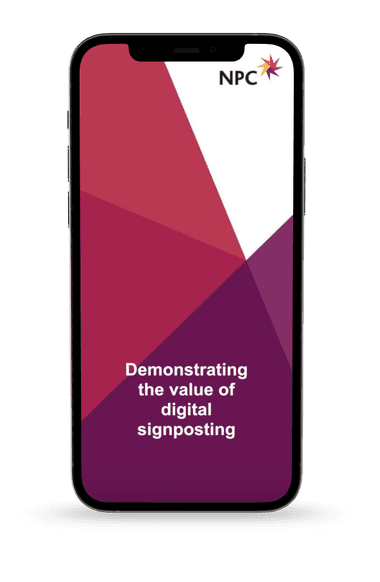Neontribe has been involved with NPC’s “Signposting+” project since it began. Its core objective “to improve the quality of life for young people and communities, and the value that technology and data can bring to this” is dear to our hearts. We’ve been working on projects to benefit young people since we started up as an agency, and we’re proud of the impact we’ve helped deliver.
In the first phase of the project, we researched, designed, and delivered “My Best Life”, a signposting site to help young people find services in Lambeth. NPC passed it on to young people’s advocacy organisation, Mind of my Own, and we helped them rewrite it as a commercial product.
This time, though, we were on board for our user research skills.
Meeting the needs of young people involves continual interaction and collaboration with testers from the target audience, iteratively refining services based on their feedback, and that of other users. In the latest phase of the project, we’ve been looking at signposting through the eyes of a group of young people.
Result
“All these terms are on all of them, so it doesn’t really narrow them down…I’d just want to search for support for dyslexia.” -Young person, User Research Group
Through our research, we identified themes for best practice and specific recommendations to the project partners that NPC was working with. Ultimately, the goal was to empower young people to get support whenever they needed it.
To cater effectively to the needs of young people, it's crucial to understand their mindset, particularly their emotional state when seeking support. This helps identify services which match their needs, providing a user journey that supports their understanding of what they need.
If they’re not familiar with specific support services, young people often start their search on Google. However, it's important to recognise that they are receptive to guidance as they navigate this process of discovery. In this exploratory phase, signposting services can play a pivotal role in assisting them in narrowing down and selecting options that suit their needs.
We recommended that by asking young people the right questions, providing a useful taxonomy of services, and providing well-written supporting content will all be useful for them at this stage. Once a young person has developed a clearer understanding about what assistance they need, they should be given the autonomy to choose the most suitable option for them. Additionally, offering related services may be beneficial due to the interconnected nature of support issues.
These findings were recommendations that we made to NPC to help improve how young people find support services that they need at the right time.
What we did
We ran three “Test and Learn” sprints, iterating on the objectives we set ourselves, and the techniques we used each time. We focussed on signposting services provided by four partner organisations: The Mix, the National Support Network, Chasing the Stigma, and My Best Life.
In the first round of research, we concentrated on the usability of signposting services with the aim of finding out how usable partner sites were in a fictionalised scenario. We developed and used a persona for this testing for safeguarding purposes. While we were keen to hear young people’s opinions, we didn’t want them to feel they had to share their own lived experience without the shield of a fictitious voice to speak with.
In the second round, we moved on to considering the breadth of services offered by signposting sites and asked how helpful young people found the partner sites across a range of issues. Again, we used a persona, this time with a range of voices which we validated with our cohort of young people.
For the next round, we focussed on specifics of the experience for each of our partner organisations’ sites, using the same personas from the previous round, but going deeper into particular features. Notably, 2 of our partners had iterated their services since the second sprint and we wanted to investigate the impact of their changes.
In the final workshop, we identified the data that young people found most useful when being signposted. We then distilled their experience of the project into recommendations for improvements, both for our practice and for the project partners’ services.
Penny Nkrumah, NPC’s lead on the work says, "Harry and the Neontribe team made a meaningful impact on the project’s quality. They were pivotal in sharpening our plan and delivering the research activities. Their work delivered the user-centred insights that are so useful to the signposting services that help young people get the best outcomes they can."
Tris Lumley, Director of Innovation & Development at NPC, said, "Harry and the Neontribe team made a meaningful impact on the project’s quality. They were pivotal in sharpening our plan and delivering the research activities. Their work delivered the user-centred insights that are so useful to the signposting services that help young people get the best outcomes they can."
